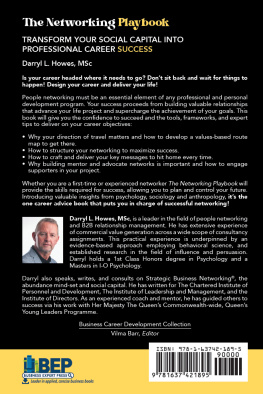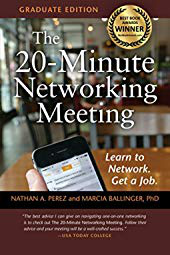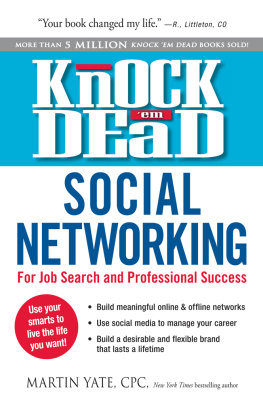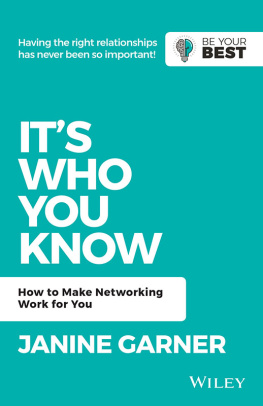Published in 2022 by The Rosen Publishing Group, Inc.
29 East 21st Street, New York, NY 10010
Copyright 2022 by The Rosen Publishing Group, Inc.
Portions of this work were originally authored by Suzanne Weinick and published as Professional Connections: Learning How to Network. All new material in this edition was authored by Dwayne Hicks.
All rights reserved. No part of this book may be reproduced in any form without permission in writing from the publisher, except by a reviewer.
Names: Hicks, Dwayne, author.
Title: Professional networking / Dwayne Hicks.
Description: New York : Rosen Publishing, [2022] | Series: Be an effective communicator | Includes bibliographical references and index.
Identifiers: LCCN 2021029141 (print) | LCCN 2021029142 (ebook) | ISBN 9781499470239 (library binding) | ISBN 9781499470222 (paperback) | ISBN 9781499470246 (ebook)
Subjects: LCSH: Business networks--Juvenile literature. | Online social networks--Juvenile literature.
Classification: LCC HD69.S8 H53 2022 (print) | LCC HD69.S8 (ebook) | DDC 650.1/3--dc23
LC record available at https://lccn.loc.gov/2021029141
LC ebook record available at https://lccn.loc.gov/2021029142
Some of the images in this book illustrate individuals who are models. The depictions do not imply actual situations or events.
CPSIA Compliance Information: Batch #CWRYA22. For further information contact Rosen Publishing, New York, New York at 1-800-237-9932.
CHAPTER 1
CULTIVATING CONTACTS
CHAPTER 2
CREATING A PROFESSIONALNETWORK
CHAPTER 3
ONLINE NETWORKING
CHAPTER 4
ETIQUETTE AND SAFETY ONLINE
CHAPTER 5
FINDING SUCCESS WITHNETWORKING
N etworking is creating personal relationships that are helpful to both parties. This is best done face-to-face. You might meet an acquaintance for coffee to talk about a new project. You might visit local shops to meet businesspeople in the community. You may even bump into a friend of a friend on the street. However, as the internet continues to evolve with new ways to connect users all over the world, networking will continue to change to use the new technology. These are all ways people start to build their professional networks. The key is to keep your contact information organized so that your network can propel you to succeed in your professional life. Networking is an important skill for job searching and career building.
You may not realize it, but you likely already have a good start on a professional network. Think of the people closest to youparents, grandparents, older brothers and sisters, aunts and uncles, and friends of the family. Even your friends can be network contacts. These are often the first people we turn to when we are in need of help or support. But the list doesnt end there. Your network may also contain coaches, teachers, religious leaders, and others you interreact with during a typical week. Even then, these are just the beginning steps in building your network.

You usually dont have to look far to find your network. It includes the people you love and respect. But your network doesnt need to end there.
Networking is applying your interpersonal skills in a professional setting to meet new people and make new connections. Every person that you know may someday be a potential client, employer, or coworker. The key is to learn how to make your relationships work to your advantage and to capitalize on your network of contacts. You must be able to have conversations with individuals on a personal level in order to enhance your communication skills. This will be vital to building a career and establishing lifelong mentor relationships.
Social networking websites function as online communities that connect people with common interests, political or religious beliefs, shared backgrounds, and careers. The most successful of these online social networking sites is Facebook. Facebook has transformed the way people distribute information about themselves and receive information about their friends. The identity you create on Facebook is your global resume.
In the age of Facebook and other social sites like LinkedIn and Twitter, social networking is a very public forum for building connections. Many experts believe that the intimacy of personal conversations is becoming a lost art. However, to get noticed in this vast network of people, you must be able to navigate the internet and have personal interaction skills. People who create their own profile or page on these online networking sites must learn to manage and display this information. As with any new skill, learning to network effectively takes practice and planning.
CHAPTER 1
CULTIVATINGCONTACTS
T he casual conversations we have with friends are clearly different from the conversations we have with coworkers, employers, clients, and others we meet in the professional world. This is not to say that you cant be friends with your coworkers. In fact, a friendly work environment is preferable to one thats stuffy or even hostile. But all workers need to keep one thing in mind: Im at work! And I need to act like it.
Even if your goal in speaking to someone is to ultimately get a job, making a personal connection is key to forming productive professional connections with others. When you meet someone for the first time, finding common interests or experiences will help change a stranger into a friend or professional colleague. The technique for making this transformation is the art of social interaction. Theres no formula for creating a personal connection, but there are skills you can master in order to make the process work for you.
Networking is building connections on a personal level. For some people its difficult to approach a stranger in a room full of people. The first step is to be yourself and allow others to see the real you. When you approach someone, you should do what you can to learn something about that person, and share something about yourself. You need to ask questions that prompt the other person to share information about themselves: How long have you lived in California? Where did you go to school? These are the types of questions that create a personal conversation and can give you information about the persons life, values, and interests. This helps you to form a personal connection with a new acquaintance.

Networking can happen just about anywhere, whether at a professional or casual gathering.
Once someone shares information with you, you can share similar information with them about yourself. You may find that the person youve just met is interested in the same activities, and that can lead to a meaningful connection. You might let someone know that youre involved in groups or organizations pertaining to your mutual interests. Even mentioning that youve read a good book or article about a shared interest could lead to a stronger personal connection.


















